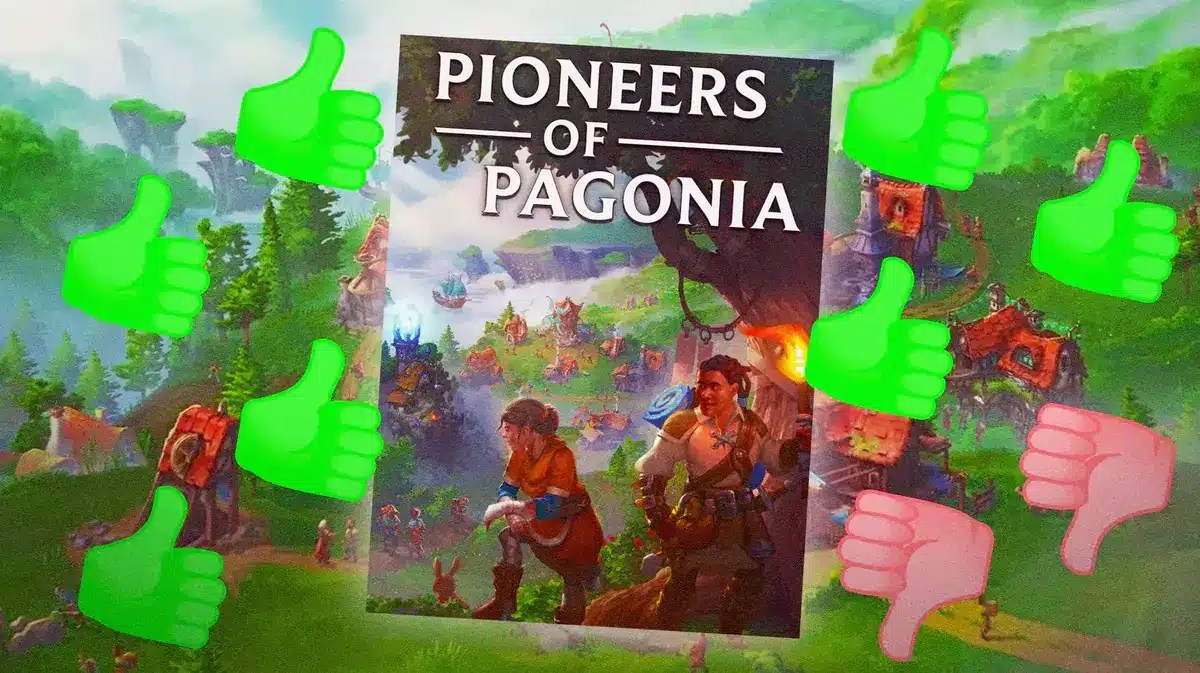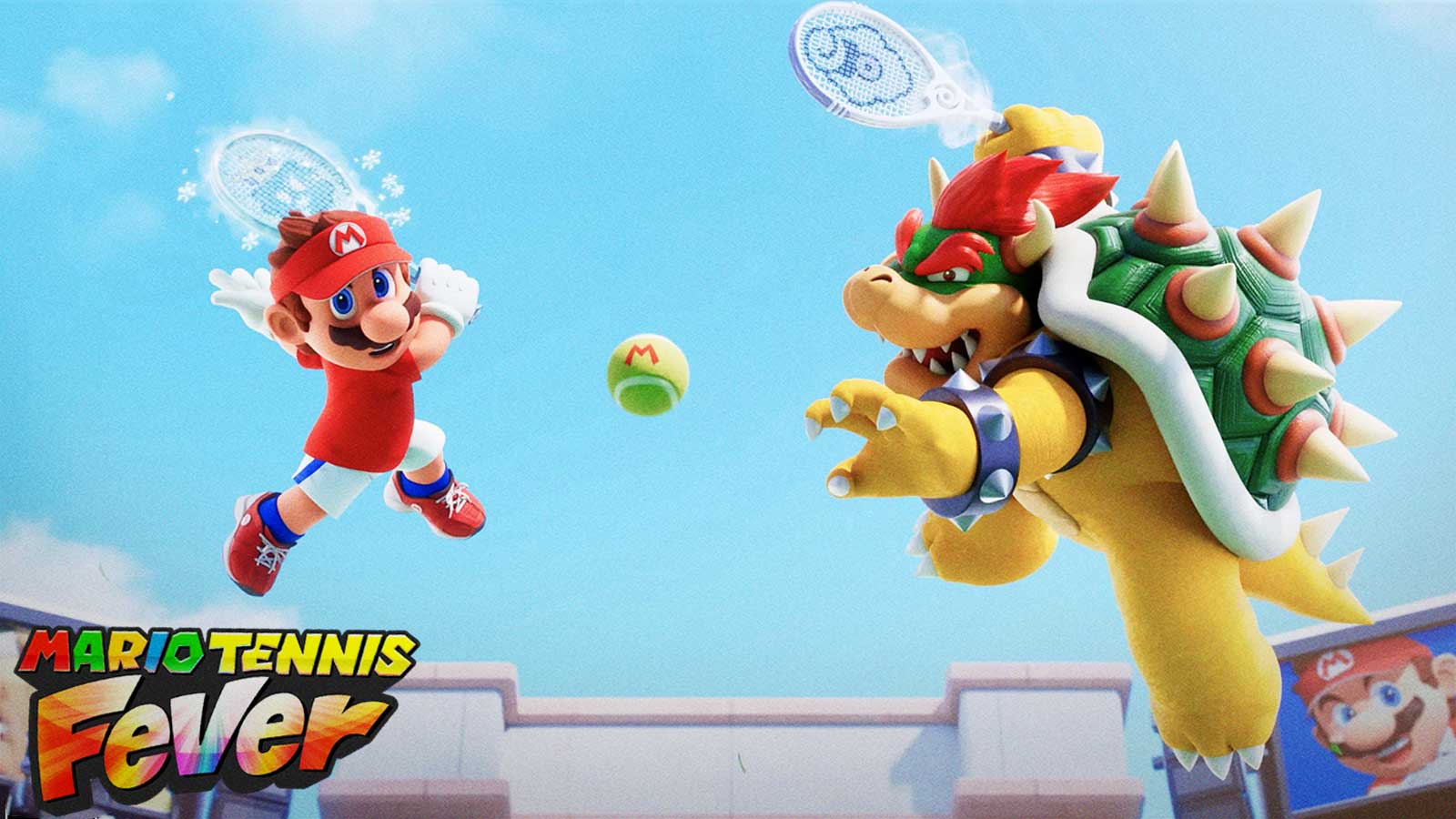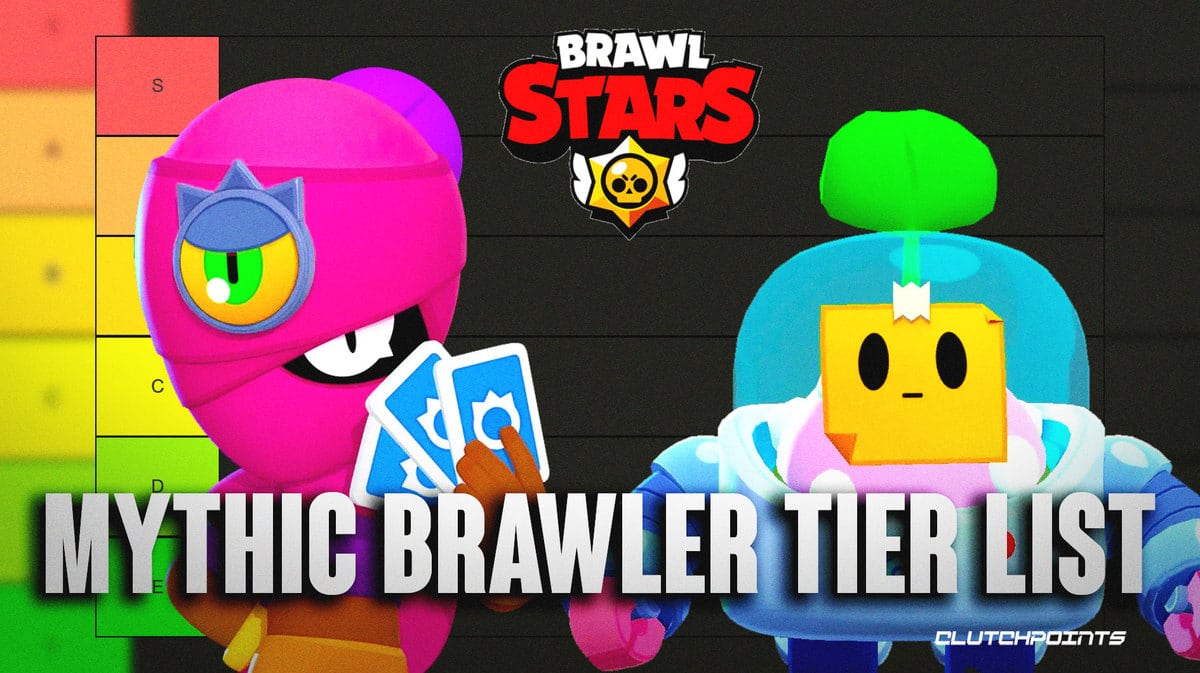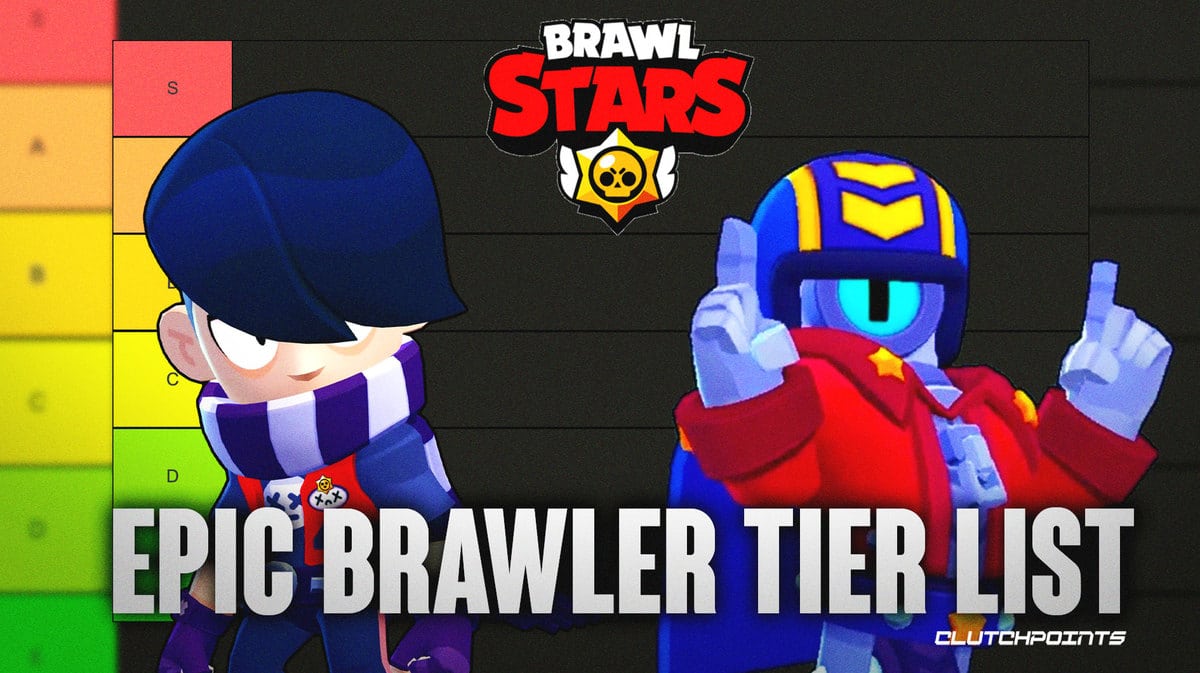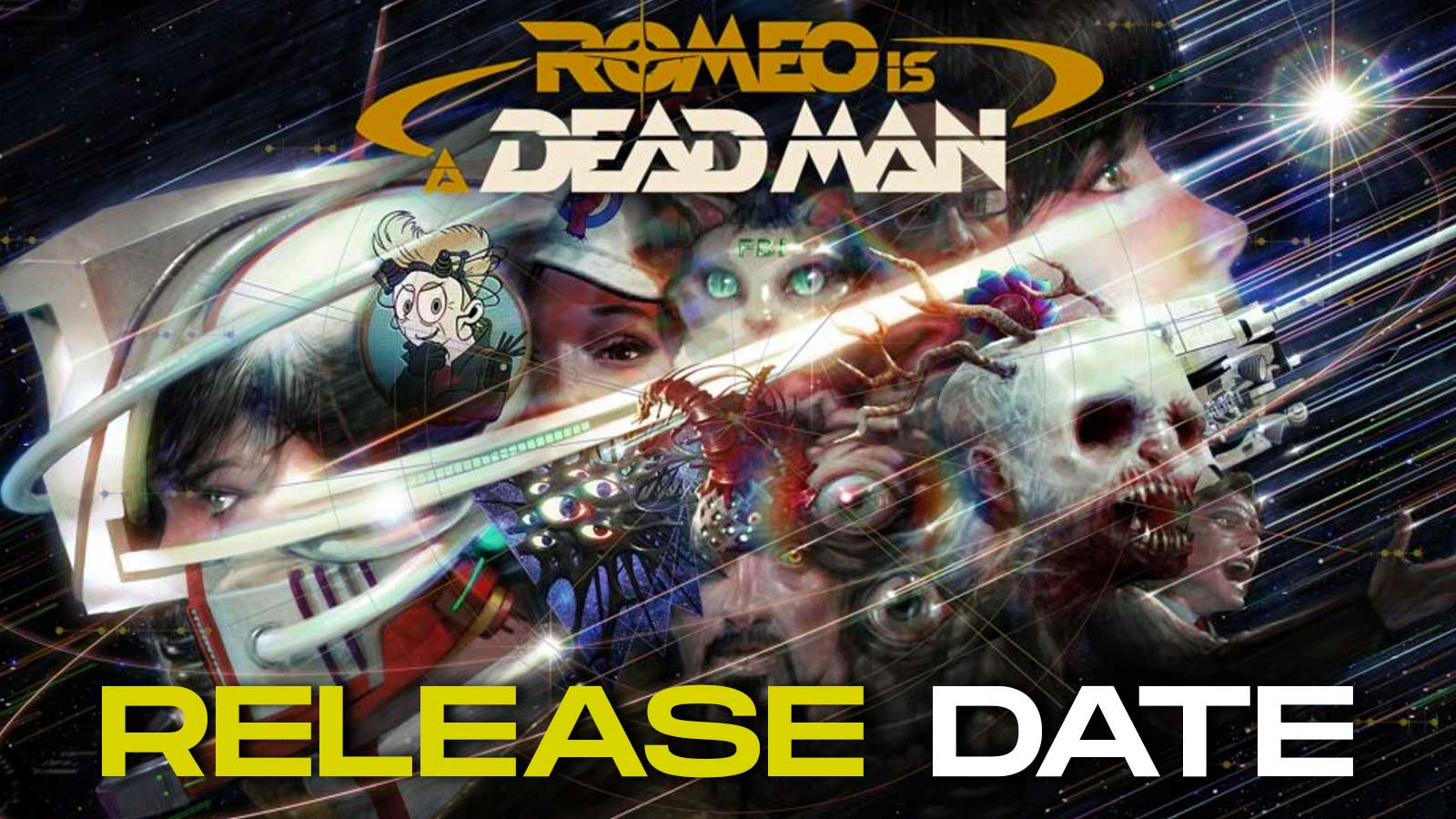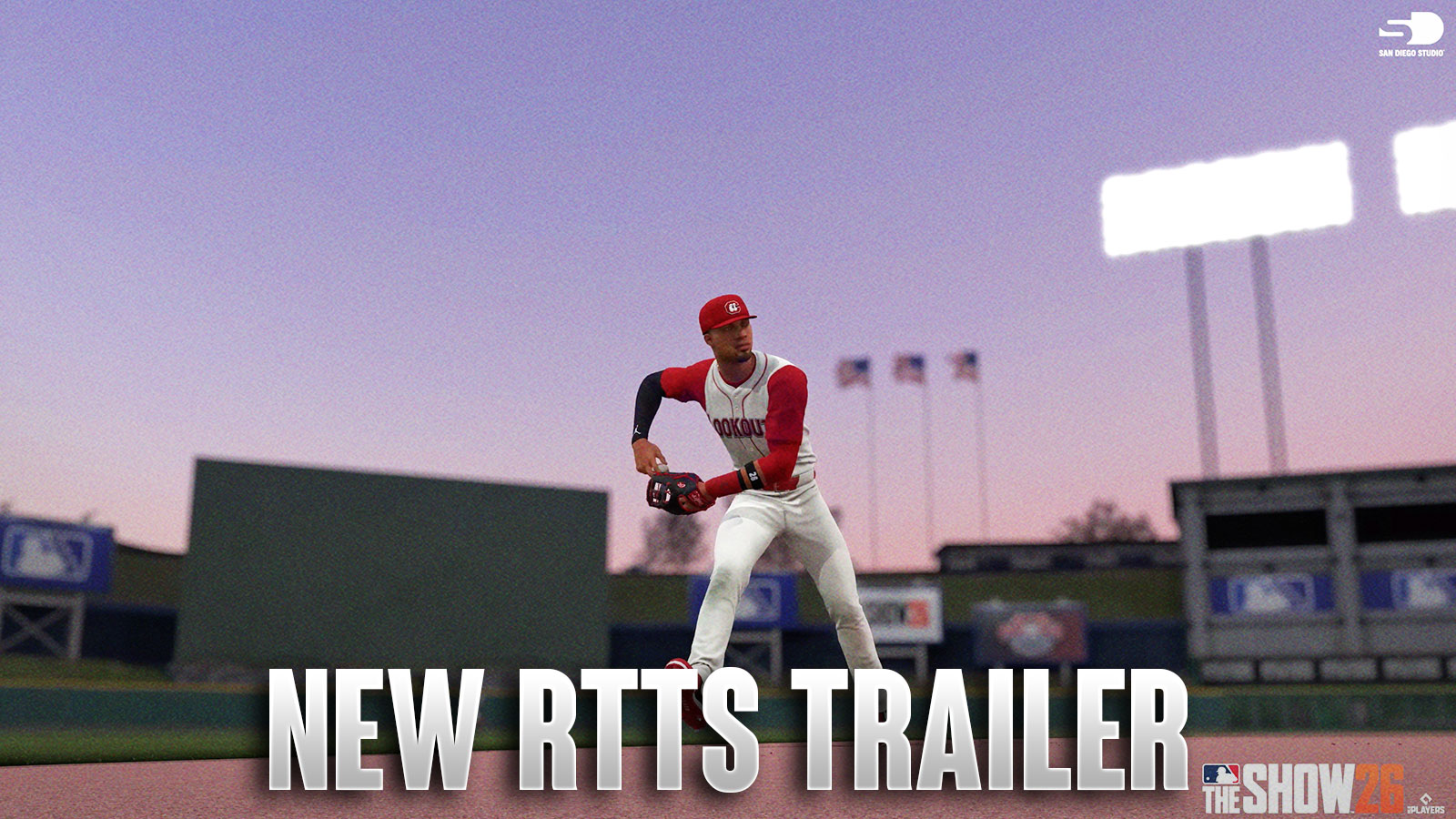If The Game Awards 2023 would be any indication, it's apparent that the video game industry has very little interest nowadays in creating city-building games. Apart from (the horrendously optimized) Cities: Skylines II and (the ill-fated) Settlers: New Allies, there weren't a lot of big-budget city builders that came out this year. Thankfully, indie developers are always there to fill the gaps left by their gargantuan competition, and there's always a good game out there developed by smaller studios worth taking note of. One of them is Pioneers of Pagonia, developed by and published by Envision Entertainment, and in this Pioneers of Pagonia review, we tackle the pros and cons of this new city-building game that recently entered early access.
Pioneers of Pagonia Review: What is Pioneers of Pagonia?
Pioneers of Pagonia is a spiritual successor to The Settlers, a three-decade-old IP managed by Ubisoft. Released on December 13, 2023, on Steam Early Access. The Settlers was dormant for about a decade until its most recent entry came out this year, The Settlers: New Allies. Sadly, fans of the franchise weren't happy with the game. One of the reasons why it took Ubisoft to bring out a new Settlers game was because Ubisoft had creative differences with the original creator of the franchise, Volker Wertich.
Wertich, who has been working with Ubisoft ever since the beginning of The Settlers franchise, left Ubisoft to found his own development company, Envision Entertainment and took his vision with him there. The result of his divorce from Ubisoft is this game: Pioneers of Pagonia.
I'm not going to pretend to have played The Settlers from the beginning. I am aware of its existence and I played the Nintendo DS spin-off back in the day, but I'm confident in my experience with other city-builders. I cannot compare this game to how The Settlers are supposed to be, but many people on the Internet have commented that this game stays true to The Settlers experience more than Ubisoft's most recent entry. I think that's an important report that I had to make to contextualize this game, while the rest of my review will take on the game at face value.
Pioneers of Pagonia Gameplay
Pioneers of Pagonia sets itself apart from other city-builders by giving you a high base starting population, whereas other city-builders most of the time set you out with zero population. It makes sense for Pioneers, given its setting where you are leading pilgrims to a new world to settle there, which allows you to start each map fast and quickly. The game's quick pacing at the start will eat up any player who's unprepared or unfamiliar with the game's mechanics because each map really opens with all options available right from the get-go.
Having access to a population of workers, guards, and other kinds of villagers means you can start your economy with any industry you want. Each map also generously gives you a hefty amount of building materials, enabling you to set out on any course you want from the start. It's still important to cover all your bases, of course, so that you don't lose steam later on, which is why knowing what you're doing is vital in keeping your pace and momentum in the game. That means setting up woodcutters and miners to cover your foundational materials for all building types, making sure that you have enough resources to keep pace with your building plans.
That being said, the game does let you off the leash and in my opinion give you way too much freedom. I have substantial experience in playing city builders like Anno, Caesar, Pharaoh, SimCity, and Stronghold and I know the ins and outs of the genre. Still, I struggled for a while completely understanding and taking in the game's intricate economy. The game's economic intricacies lead to a rich gaming experience, requiring your attention at all times as you try to make sure that your supply line has sufficient allocations. But if you're new to the genre, the game will feel overwhelming, especially with how much micro management you sometimes have to delve into as you manually instruct individual buildings what kind of resources or products they should produce.
Perhaps those who are already familiar with The Settlers formula would easily figure out everything that the game has to offer. But my criticism isn't exactly on how hard it is to learn the game's mechanics. When you get your bearings, it's very easy to figure out the formula to succeed in Pioneers of Pagonia. However, the game barely has any tooltips to help you figure out what individual resources do, what each building does, what the different units do, etcetera. While the game offers the option to have a helpful tooltip that dictates to you what you need to build next based on your economy's needs, it does not adequately explain what each of the buildings does. You need to observe your city as you build it to figure out how each building is related to each other, and how your villagers react to the different buildings you put up.
I think the game would benefit from having a dedicated tutorial mode to allow players of different levels of familiarity to get a grip on the game. The genre is intimidating enough, and just throwing new players into a sandbox could leave many frustrated. Even a wiki-like in-game encyclopedia just explaining what each building does, what each unit requires, and what each resource makes, would be a welcome addition to the game. This is a quality-of-life feature that is present in many city-building games, so hopefully, Pioneers of Pagonia gets one, too.
An in-game encyclopedia would also be especially helpful in planning ahead your army and guards. Currently, the game features different kinds of units, with obvious power progression based on the rarity of materials needed to supply them with their weapons. However, the game does a poor job of communicating just how gradual or progressive the power differences are between the different units, not to mention different unit types. For example, it's obvious that a Veteran Guard must be stronger than a Guard, and that a Veteran Soldier is stronger than a Soldier, but is a Veteran Guard stronger than a regular Soldier? You are left to your own devices in determining their power levels.
That gets a little bit more tricky when you consider the different kinds of enemies available in the game. In lower threat levels, there are thieves and bandits, while higher levels feature mythical creatures like werewolves. While it's clear that werewolves would require a stronger kind of army versus what would be required of you to beat down thieves and bandits, it's not clear just how much power is needed in the first place. You'll have to find out by yourself by sending out soldiers and seeing what sticks.
Ironically, I'm thankful that the game's combat is as simple as it is. Soldiers, Guards, and Adventurers reside inside specific residences or are garrisoned inside military structures like Guard Towers and Garrisons. You can then select the military structure and choose where it would send its stationed military units. Changing the rally point takes effect immediately, so when I see my soldiers getting beaten down by the bandits, I can easily send them back home to cut my losses.
Combat is very simple: two units from opposing sides meet each other, and they fight until one of them dies. There's not a lot of nuance in the tactics or strategy here apart from timing and brute force, and that's not bad by itself. It's just good enough to make it worthwhile to engage without taking away too much time from your city building.
Besides, the Pioneers of Pagonia's objectives aren't always combat-focused. While there would be maps where you will have to take down enemy camps, the majority of the game's objectives relate to trade. As you build your own little settlement, and as your explorers discover more of the island and expand your borders, you will meet the Tribes of Pagonia. These tribes will have identical buildings as you, as well as identical villagers. Once you've constructed a trading post that is within range of the tribe's trading post, you'll be able to trade with them. Tribes will always have a couple of resources they need you to supply to them, which you can then fulfill with the help of your traders.
On top of trading, some tribes will also ask you to accumulate wealth through coins minted using copper or silver mined from the mountains. Some tribes will require you to make a show of force by building a formidable army. Some tribes will ask you to finish the construction of special points of interest on the map or transport materials to a faraway camp to the opposite end of the map. While you will eventually explore and expand your borders to the entirety of the island, land acquisition isn't actually the end goal of the game. Once all tribes' conditions are fulfilled, they become allies, and you can assimilate them to become part of your main settlement. Turn all tribes into allies and you win the game.
All maps follow this simple formula, although you can change up the difficulty by customizing the features of the island you're settling on. You can add more enemies, or lessen the available resources on the island. The game then creates a random island based on random seeds, but to be honest, based on my gameplay, there doesn't seem to be a lot of variance between maps of the same map type. Maps of the same biome almost always feel and play the same. Therefore, true diversity only lies in the kind of biomes available in the game.
All that being said, the game's overall difficulty leans towards the easy and relaxing side. You can play this game without giving it much thought and the game will rarely punish you for your mistakes. There's always a clear road to recovery even when you mess up your build order and end up not having enough resources to proceed to your optimal path. There doesn't seem to be a real game over in the game, unless you somehow find a way to wipe out your entire population down to zero, which I think requires some effort to achieve.
One final comment just to end this section: I find it odd that the game only has two speeds: 1x and 5x. I would have expected there to be 2x and 3x speeds. And only because I've become too used to the 5x speed already as the only faster speed available, it has become a bit too slow for me as well. More options, which I would expect to arrive in future updates, would be helpful.
Pioneers of Pagonia Story
Pioneers of Pagonia's story is straightforward: a calamity has led to Pagonia experiencing hardships. Seeing the opportunity this disaster presents, you control a merry band of Pioneers looking to help by settling the land and providing the tribes of Pagonia with what they need.
Frankly, not all games need a story campaign, and city-builders usually have only vague strokes of a plot for players to follow and get invested in. However, Pioneers of Pagonia has the potential to tell a nice, heartwarming story of pioneers arriving on the island to help out troubled tribes. It would give more flavor and purpose to the game's objectives instead of just being a list of tasks to tick. Pioneers of Pagonia is one of the rare city-builders that would definitely benefit from having a story campaign mode.
Pioneers of Pagonia Graphics
Pioneers of Pagonia has a very charming art style, from the way the villagers look to the design of the buildings. There are vibrant colors and earthy tones, making the whole game feel very homey and relaxing. The villagers are the lifeblood of the entire game's presentation – villagers who look happy at what they're doing, toiling away for the betterment of the many. The jolly workers always look energetic, regardless of what they're doing.
The game's detailed build and work animations also add to the charming presentation. The buildings, once you've placed them on the map, don't just pop up completed. Instead, carriers will bring materials to it, diggers will dig up the foundation, and builders will start taking each piece of resource needed to build the structure and begin construction. You can see every structure being built from the ground up.
Once your buildings are functional, villagers will begin their employment in them, provided they have the correct tools available. You will then see carriers bringing resources like wood to the woodcutter, which the woodcutter will then turn into lumber. The lumber can then be brought by the carriers to the wood workshop, where a worker can then turn it into a wooden shield. You'll then see the wooden shield brought to the military academy, and when the military academy also receives a sword, out comes a Soldier, marching to the garrison.
These animations make your settlement feel lived in and alive, seeing each and every villager contributing to your little settlement, all these visual cues also help in giving you clues about what your village needs, what resources you lack, and so on.
There are always things to improve on, but this is just a very minor gripe of mine, which in no way lessened my enjoyment of the game. I would have enjoyed it if there were more variety in the villager models, like if Veteran Soldiers could be more visually distinct from normal Soldiers. It would also be nice to have Villagers that don't look like everyone else in the village. Like, have the same clothes on, but have different face models. That would be nice. But again, this one is just a nitpick.
Pioneers of Pagonia Music and Sound Design
Pioneers of Pagonia is very chill and relaxing. This vibe is carried by its pastoral music that sometimes transitions into an adventurous overture when your explorers start uncovering more of the island and dispelling the fog of war. At times, the music will sound a bit ominous when your settlement comes across a new enemy camp, when some of your villagers are attacked by bandits, or when thieves infiltrate your settlement to steal resources. Still, even during these times, the sense of calm and relaxation remains.
There are just some times when the game's sound effects seem to bug out, where events that happen from far away incongruently have higher volume compared to events that are happening nearer to your point of view. This becomes more frequent when you are on x5 speed, although these aren't that bad to take you out of your enjoyment from the game. Hopefully, Envision Entertainment will be able to have better volume equalizing in the future.
Pioneers of Pagonia Early Access Roadmap
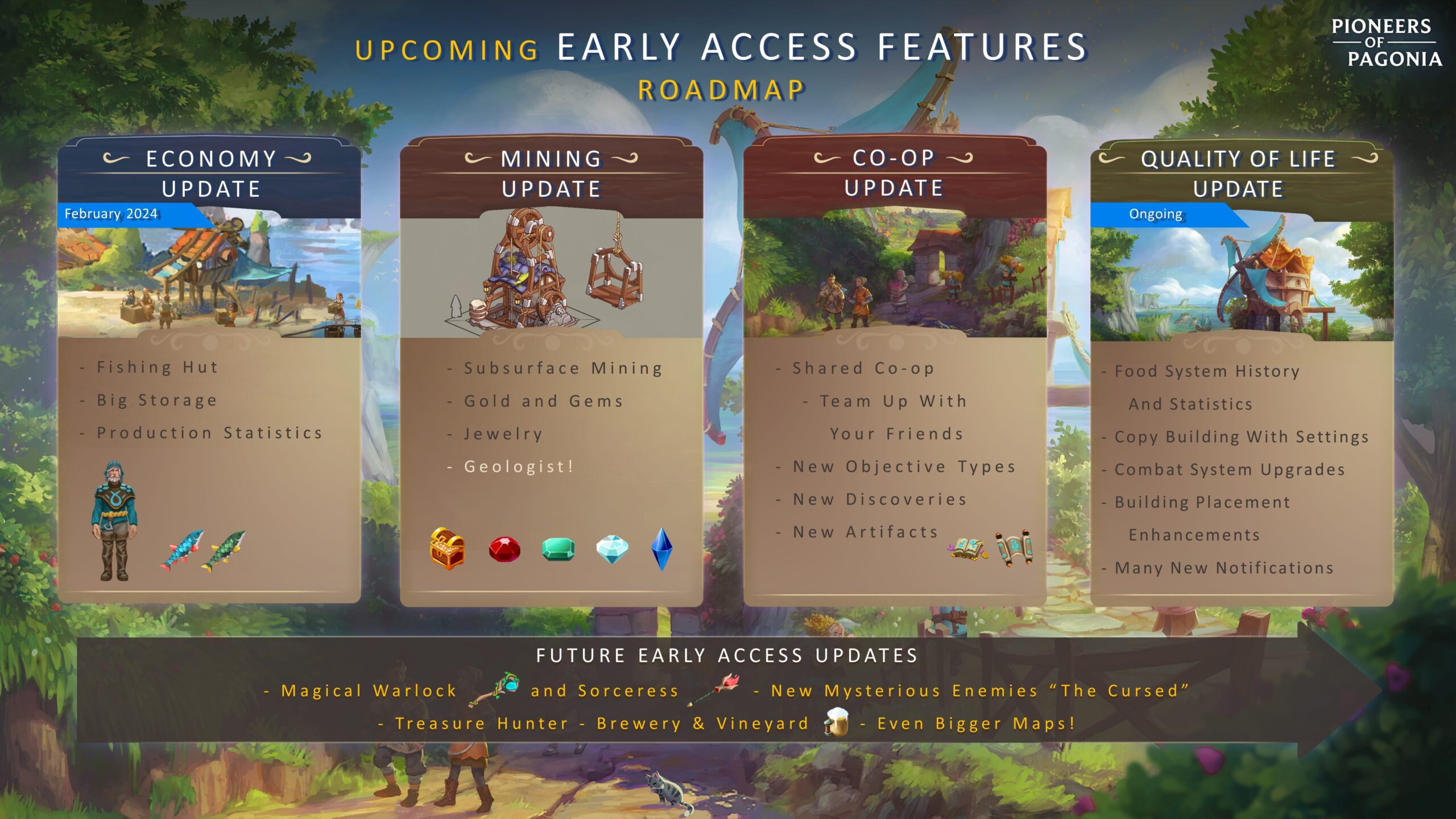
It's only fair for me to also share Pioneers of Pagonia's early access roadmap as part of this review so that you can be informed on what else the developers promised to bring to the game in the future. This will help you decide better how much value you'll get from purchasing this early-access game on Steam. As of December 27, 2023, the game will eventually have:
- February 2024 – Economy Update – with the addition of Fishing Huts, Bigger Storage buildings, and Production Statistics.
- Mining Update – Subsurface mining, gold and gems, jewelry, and geologist units.
- Co-op Update – Shared co-op, new objective types, new discoveries, and new artifacts.
- Ongoing – Quality of Life Update – Food System History and Statistics, Copy Building With Settings, Combat System Upgrades, Building Placements Enhancements, New notifications
Other advertised upcoming features include Warlock and Sorceress units, New enemy types, Treasure Hunter units, bigger maps, and Brewery and Vineyard buildings.
The game is expected to remain in early access development for the next six months.
Verdict: Is Pioneers of Pagonia worth your time and money?
In my opinion, for $25.49, the game is definitely worth a buy. It's a chill city-builder that has a good gameplay loop that has a definite end state that gives you the satisfaction of victory that other city-builders might not give. It's a game you can pop up for an hour or so of gameplay and beat, put down for a while, and return to the next day for another run. The game's loop also becomes very familiar to you the longer you play it, so you get into a groove that lets you be carefree and allow you to relax while still completing maps.
If you're not too keen on city-builders or are not confident in your city management skills, you might want to wait for a sale. The game is still fun to play even if you have very little city-building experience, as the charming presentation can get you some good laughs and make you feel warm inside even if you're not really working towards the game's objectives. But the game's rather steep learning curve might be a deal-breaker for some, as its UI and gameplay mechanics only feel intuitive to those who are already familiar with the genre.
Perhaps you'll only have to avoid this game if city-building really isn't your thing, or if you are looking for a more action-packed experience. This game is very laidback, so you won't be getting adrenaline pumped into your veins playing this.
With that being said, I really enjoyed playing the game and I see myself returning to it from time to time for a quick go. It would be fun to see where the developers would be taking the game next, and what kind of new features they can introduce apart from those that they've already indicated in their early access roadmap. Of course, adding co-op will add a new layer of value for this game, so we'll have to revisit this Pioneers of Pagonia review when multiplayer and other development milestones are reached. But for now, we are very confident in giving Pioneers of Pagonia the score of…
Score: 7/10*
*Early Access Review Score – updated on December 27, 2023. We'll update this review when milestones in the development process are reached, or when the full game gets released.
Editor's Note: ClutchPoints received a PC review copy of Pioneers of Pagonia to allow us to cover the game. This copy did not, in any way, affect this Pioneers of Pagonia review and score.

